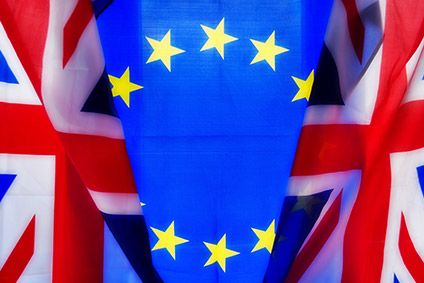
UK food exports to the European Union rebounded in February following a post-Brexit slowdown in January.
Figures released by the UK’s Office for National Statistics (ONS) yesterday (13 April) showed exports of food and live animals to the EU increased by 77.4% to GBP700m (US$963.2m) in February, when compared to January, after being significantly impacted in the first month of the year.

Discover B2B Marketing That Performs
Combine business intelligence and editorial excellence to reach engaged professionals across 36 leading media platforms.
Shipments of fish and shellfish also saw an uptick as exporters adjusted to new regulations following the end of the Brexit transition period on 1 January.
“The disruptions to food exports in January 2021 appear to have largely been overcome and may have only had short-term impacts on trade,” the ONS said.
Anecdotal evidence from UK food exporters in January suggested they were experiencing significant hold-ups at borders linked to additional paperwork and checks introduced following the UK’s exit from the EU.
In January, according to ONS data, UK exports of food and live animals to the EU stood at GBP400m, more than halving from the GBP1bn recorded in December.

US Tariffs are shifting - will you react or anticipate?
Don’t let policy changes catch you off guard. Stay proactive with real-time data and expert analysis.
By GlobalDataOverall UK exports to the EU jumped by 46.6% to GBP11.6bn in February, following January’s 42% slump when firms struggled with new trade rules.
However, the ONS said exports were still below last year’s levels and imports from the EU had seen a weaker recovery.
An ONS spokesperson, quoted by UK broadcaster the BBC, said: “Exports to the EU recovered significantly from their January fall, though still remain below 2020 levels. However, imports from the EU are yet to significantly rebound, with a number of issues hampering trade.”
UK imports from the EU rose by 7.3%, or GBP1.2bn in February to GBP17.1bn, after dropping 29.7% the month before. The figure is still 12.5% off February 2020 levels.
In late March, the UK government said there were indications UK exports of meat, seafood and dairy to the EU were recovering.
Speaking to legislators, the UK’s Department for Environment, Food & Rural Affairs (Defra) said there were signs trade was “picking up” from a slump in January in the wake of the country formally leaving the EU’s single market and customs union on 31 December.
Responding to the ONS data, a spokesperson for UK industry body the British Meat Processors Association said: “The media reports of recovering trade in February miss the point that fresh food exports are not recovering to the same extent as other goods because the same barriers to trade remain unresolved. Even if some trade has resumed there is an extra cost incurred in export health certification along with substantial time delays which makes British meat exporters less competitive.
“It is still widely accepted that the fresh food issues are where the big drops have been and until groupage issues are resolved and the system is simplified the barriers will still prevent full resumption of exports and we will not be rid of the extra cost.”





